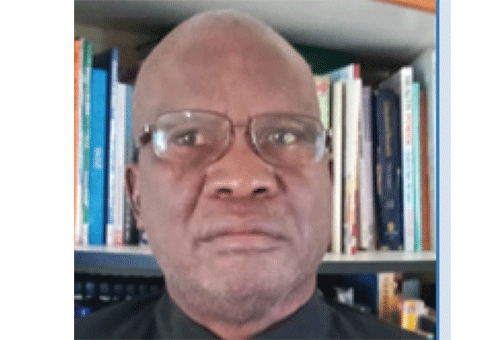Prof. Malaka Lilemba
Namibians sacrificed their lives for freedom and equality with the hope of living in harmony and unity. This is amplified in the preamble of the Constitution, which states that Namibians will strive to achieve national reconciliation and foster peace, unity and a common loyalty to a single state. Whereas some of these traits have been achieved, many Namibians have not reconciled to themselves.
Politically, the nation is torn apart by ideological and ethnic divisions. This is explained by the number of sixteen registered political parties in the country. Although this is democracy at its best, the failure of the parties to merge tells a story of political intolerance. Within the parties, themselves, is also another narrative of intolerance through infighting. This is evident through tales of calling off party elections in the regions because there were some irregularities emanating from ethnicity and other corrupt and greedy self-interests. Party members are always reminded of sell-outs and hibernators, especially in the ruling party. But Article 17 of the Constitution spells out clearly that all citizens have the right to form and join political parties. Differences in opinions, even among members of the same political party, can be allowed, as people do not think alike.
The more different opinions the party accommodates, the better for its survival, as it will tap into the members’ wisdom. As we say in Sifwe, “munwe wonke kautolyi ngina”, meaning one finger alone cannot pick a louse.
Sessions in parliament are circuses like the ones seen in South Africa, where members are supposed to be honourable but have reduced themselves to shenanigans.
Instead of discussing pressing issues, our members of parliament relish jokes and name-calling. Yes, these honourable members are immune from persecution in whatever they do in the august house, but today’s sessions are live on television and captured by the media.
This means the public has access to these sessions. Imagine children and young people watching all these derogatory remarks and hate speeches on their screens.
We ask ourselves why the country is caught in a web of chaotic situations and tilting on the edge of lawlessness.
The House of Parliament is supposed to be exemplary in respecting the dignity of everybody – whether in the house or elsewhere – because that is where laws are manufactured, which should be distributed and implemented to the masses.
Mazrui (1986), in his documentary, ‘The Africans: A Triple Heritage’, gives the example of the Nigerian parliament shortly after Independence, which was supposed to be a house where members exchanged policy disagreements and made boisterous jokes.
Our parliament lack such credibility in many ways. One may say that it is better as compared to other houses of parliament, where they exchange blows and fists during sessions. On the socio-economic and cultural horizons emerge another bitter scene of intolerance, where there is one Namibia with different nations. As Prof. Joseph Diescho recently put it, the ethnic remarks in parliament are that Namibia lacks a philosophical ideology to unite the country. In this case, leaders like Kenyatta of Kenya and Nyerere of Tanzania immediately after the independence of their countries came up with philosophical ideologies like Harambee (let us pull together at once) and Ujamaa (familyhood), respectively.
These political and philosophical ideologies managed, to a large extent, to unite their nations. Namibia has no solid philosophical ideology from the dawn of independence; as a result, unity and tolerance are mere illusions. There are hate speech messages on social media daily – and instead of correcting ourselves, there are always attacks on individuals and not on the subject. People are labelled as tribalists when they raise genuine concerns about representation in many parastatals and government-held positions. A recently posted newspaper clip in The Namibian of 20 October 2023 reads as follows: “Why do we have so many magistrates from the same tribe in Namibia? Most of them are from the Zambezi region. Is it because the chairperson of the Magistrate’s Commission is from there? Are there no other competent Namibian lawyers who can fill the bench? This is becoming unacceptable in a free country”.
Although the message might sound crude, the sentiments expressed should reverberate far and wide. It might emanate from a lack of tolerance and sensitivity to the power that be.
Whereas qualifications and experience, to some extent, are considered in the appointments, it is equally insensitive for the appointing authorities to sideline the fact that Namibia is a multicultural nation in which all groups need to be equally considered for jobs.
In case the applicants fall short of the qualifications and experience, affirmative action should be applied.
This is a government policy to balance and correct the imbalances of the past. Of course, in some sectors, the policy is implemented – but in others, it is seen as a tribalistic tendency. With elections around the corner, there will be more insinuations and character assassinations of particular individuals. The everyday song of one being an imperialist stooge and working for the West will be sung the loudest. West or East, many African politicians and their followers to a particular political line.
The reality is that Africans trade with both the West and the East, and the entities are looking for their iterests in Africa. Until Africa becomes politically and economically self-reliant, the tug of war will continue unabated.
The wars of the West and East seem to impact in Africa that citizens forget their constitutional obligation of working for the unity of purpose, but in many aspects develop a sense of intolerance.
* Prof. Makala Lilemba is an academician, author, diplomat, motivational leader, researcher and scholar.



